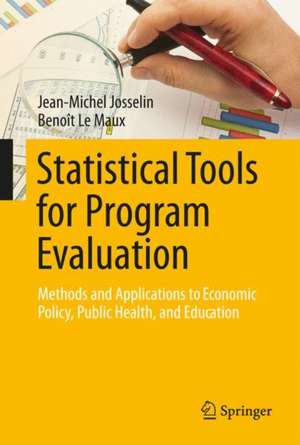Statistical Tools for Program Evaluation: Methods and Applications to Economic Policy, Public Health, and Education
Autor Jean-Michel Josselin, Benoît Le Mauxen Limba Engleză Hardback – 6 iun 2017
It not only offers practitioners from public administrations, consultancy firms and nongovernmental organizations the basic tools and advanced techniques used in program assessment, it is also suitable for executive management training, upper undergraduate and graduate courses, as well as for self-study.
| Toate formatele și edițiile | Preț | Express |
|---|---|---|
| Paperback (1) | 652.49 lei 6-8 săpt. | |
| Springer International Publishing – aug 2018 | 652.49 lei 6-8 săpt. | |
| Hardback (1) | 908.04 lei 6-8 săpt. | |
| Springer International Publishing – 6 iun 2017 | 908.04 lei 6-8 săpt. |
Preț: 908.04 lei
Preț vechi: 1107.37 lei
-18% Nou
Puncte Express: 1362
Preț estimativ în valută:
173.75€ • 181.43$ • 143.48£
173.75€ • 181.43$ • 143.48£
Carte tipărită la comandă
Livrare economică 16-30 aprilie
Preluare comenzi: 021 569.72.76
Specificații
ISBN-13: 9783319528267
ISBN-10: 3319528262
Pagini: 531
Ilustrații: X, 531 p. 139 illus., 86 illus. in color.
Dimensiuni: 155 x 235 x 30 mm
Greutate: 0.93 kg
Ediția:1st ed. 2017
Editura: Springer International Publishing
Colecția Springer
Locul publicării:Cham, Switzerland
ISBN-10: 3319528262
Pagini: 531
Ilustrații: X, 531 p. 139 illus., 86 illus. in color.
Dimensiuni: 155 x 235 x 30 mm
Greutate: 0.93 kg
Ediția:1st ed. 2017
Editura: Springer International Publishing
Colecția Springer
Locul publicării:Cham, Switzerland
Cuprins
Statistical Tools for Program Evaluation: introduction and overview.- Part I: Identifying the context of the program. Description of problems and needs, assessment of relationships among variables.- Sampling and construction of variables.- Descriptive statistics and interval estimation.- Measuring and visualizing associations.- Econometric analysis.- Estimation of welfare changes.- Part II: Ex ante evaluation. Assessment of different policy strategies that might solve the problems.- Financial appraisal.- Budget impact analysis.- Cost benefit analysis.- Cost effectiveness analysis.- Multi-criteria decision analysis.- Part III: Ex post evaluation. Assessment of the effects of a strategy after its implementation.- Follow-up by benchmarking.- Randomized controlled experiments.- Quasi-experiments.
Notă biografică
Jean-Michel JOSSELIN is professor of economics at the University of Rennes 1 (France). His research and teaching interests include law and economics, public policy evaluation, with a focus on public health (cost effectiveness analysis, decision analytic modelling in oncology and chronic diseases). He is researcher at the French National Center for Scientific Research (CREM-CNRS and Condorcet Center for Political Economy), affiliated with the health research chair Hospinnomics (AP-HP and Paris School of Economics), member since 2012 of the Health Economics and Public Health Committee (CEESP) of the French National Authority for Health (HAS).
Benoît Le Maux is associate professor of economics at the University of Rennes 1 (France). His research and teaching relate to public policy evaluation and democracy, with a special emphasis on public expenditures (microeconomic analysis of collective decision-making, econometrics, quasi-experimental techniques). He is researcher at the French National Center for Scientific Research (CREM-CNRS and Condorcet Center for Political Economy) and currently in charge of coordinating a master program in public finance and management at the Faculty of Economics of the University of Rennes 1.
Benoît Le Maux is associate professor of economics at the University of Rennes 1 (France). His research and teaching relate to public policy evaluation and democracy, with a special emphasis on public expenditures (microeconomic analysis of collective decision-making, econometrics, quasi-experimental techniques). He is researcher at the French National Center for Scientific Research (CREM-CNRS and Condorcet Center for Political Economy) and currently in charge of coordinating a master program in public finance and management at the Faculty of Economics of the University of Rennes 1.
Textul de pe ultima copertă
This book provides a self-contained presentation of the statistical tools required for evaluating public programs, as advocated by many governments, the World Bank, the European Union, and the Organization for Economic Cooperation and Development. After introducing the methodological framework of program evaluation, the first chapters are devoted to the collection, elementary description and multivariate analysis of data as well as the estimation of welfare changes. The book then successively presents the tools of ex-ante methods (financial analysis, budget planning, cost-benefit, cost-effectiveness and multi-criteria evaluation) and ex-post methods (benchmarking, experimental and quasi-experimental evaluation). The step-by-step approach and the systematic use of numerical illustrations equip readers to handle the statistics of program evaluation.
It not only offers practitioners from public administrations, consultancy firms and nongovernmental organizations the basic tools and advanced techniques used in program assessment, it is also suitable for executive management training, upper undergraduate and graduate courses, as well as for self-study.
It not only offers practitioners from public administrations, consultancy firms and nongovernmental organizations the basic tools and advanced techniques used in program assessment, it is also suitable for executive management training, upper undergraduate and graduate courses, as well as for self-study.
Caracteristici
Presents a self-contained introduction to basic and advanced statistical tools used in program evaluation Describes those tools in the specific context of public program appraisal Offers a comprehensive variety of tools and shows how to choose the most appropriate one for a program Provides clear advice on how to avoid the pitfalls of data collection and data analysis Suitable for professional application, executive and university courses, as well as self-study Includes supplementary material: sn.pub/extras












